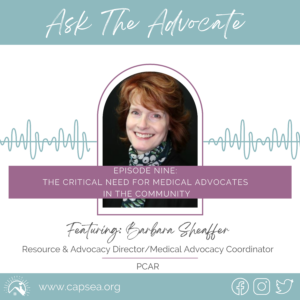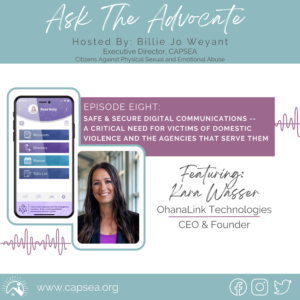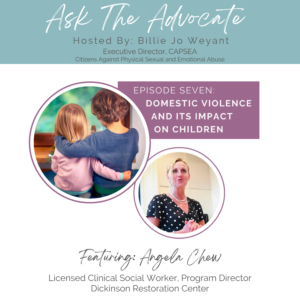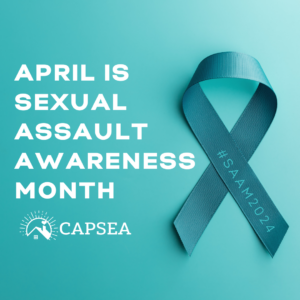Ask the Advocate Podcast: Episode 7
Domestic Violence And Its Impact on Children
Featuring: Angela Chew, LCSW from The Dickinson Center, Inc.
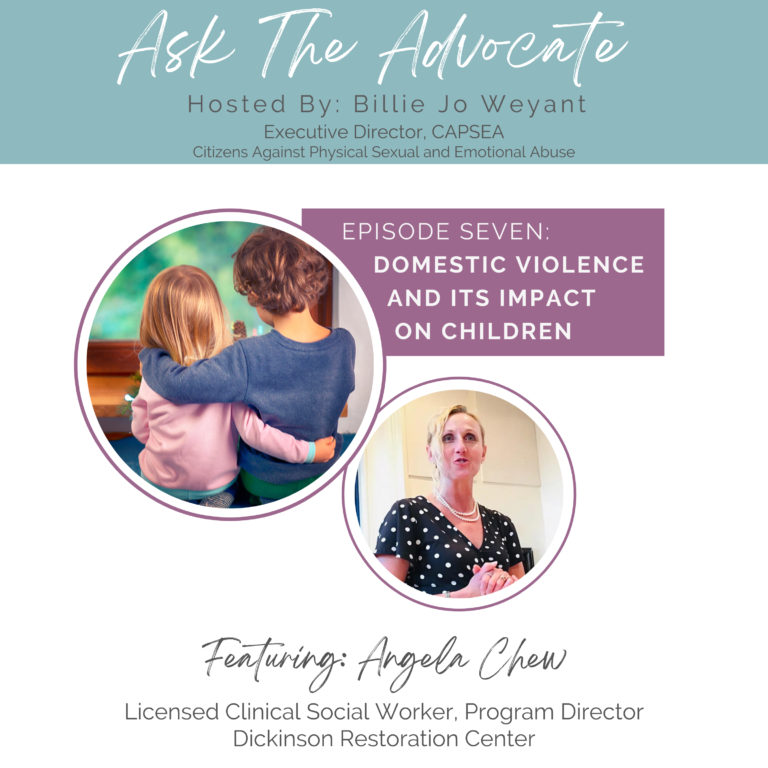
about the Episode
More than 15 million children in the United States live in homes in which domestic violence has happened at least once. In this episode, Bille Jo and Angela will dive into the proven short-term and long-term impacts that witnessing domestic violence can have on a child’s development, and what individuals can do to help these children.
Angela Chew is a Licensed Clinical Social Worker who serves as Program Director for The Dickinson Center, Inc. (DCI) Restoration Center – a 24/7 long-term structured residential facility that promotes healing and recovery. DCI is a nonprofit providing behavioral health, intellectual and developmental disabilities, and children’s prevention services in rural Northwestern PA. They are recognized as one of the leading rural behavioral health providers in Northwestern Pennsylvania and has evolved into an organization with nearly 200 employees operating in Elk, Cameron, Potter, McKean, Forest, Warren, Jefferson, and Clearfield counties. Learn more at https://www.dickinsoncenter.org.
ASK THE ADVOCATE is a podcast series featuring advocates for domestic violence, abuse, and sexual assault survivors discussing critical victim service resources. Sit down with Billie Jo Weyant and her guests each episode to discuss critical victim service resources and to help raise awareness for the most pressing challenges facing survivors and the nonprofit agencies that serve them. Watch all Ask the Advocate episodes at https://capsea.org/.
Billie Jo Weyant (00:00):
You’re listening to “Ask the Advocate,” a podcast series that features advocates for domestic violence, sexual violence, and all other survivors of abuse and serious crime. I’m your host, Billie Jo Weyant. And for the past three decades, I’ve worked in the victim services industry serving as the executive director for a Pennsylvania-based nonprofit named CAPSEA, which stands for “Citizens Against Physical Sexual and Emotional Abuse”. I invite you to join me as I sit down with my guests, each episode to discuss critical victim service resources and to help raise awareness for the most pressing challenges facing survivors and the nonprofit agencies that serve them.
Billie Jo Weyant (00:42):
Hello everybody, and welcome to “Ask the Advocate.” This is episode seven and today with me, my special guest is Angela Chew. Angela and I have known each other for many years. Angela is a licensed clinical social worker, and she’s worked for the Dickinson Center for many, many years and most recently Program Director, uh, of the Dickinson Restoration Center. Angela today, our topic is domestic violence and its impact on children. I know you and I have worked together for many, many years. I wanna turn it over to you so that you can tell folks exactly what you do and, uh, your dedication to, uh, working with children and families.
Angela Chew (01:26):
Thanks, Billie Jo, it’s great being here with you today about this very, very important topic. Um, I, as Billie Jo has said, I’m a licensed clinical social worker. I’ve been working in the field of mental health since I got my Master’s in 1995. Predominantly, most of my career, I’ve specialized in working with children and adolescence. And in that period, I have been exposed to a lot- a number of different things, but one of my specialties was working with individuals who have been exposed to trauma and traumatic events. I have gravitated into, uh, doing things with adults as well. And honestly, my new program that I’ve been operating will kind of be able to tell you exactly how some of these things impact in the long-term, as the individuals that I serve now have been heavily impacted by trauma and abuse and, and issues like that.
Angela Chew (02:19):
I’m currently on my last phase of my dissertation for my doctorate. So, you know, next time, if I have to be here with Billie Jo, it might be “Dr. Chew”. <Laugh> um, so, and I’ve been with Dickinson Center for about going on just recently. It was 12 years and have been an outpatient therapist for a long time, was the Clinical Director of Outpatient Programs, and now the director of this. I’ve worked in group foster homes in the past. I’ve worked in alternative schools for children that had behavior problems. I have been a case manager, I’ve worked inpatient, done a little bit of everything as social workers are trained to do so that’s me, in a nutshell, <laugh>.
Billie Jo Weyant (02:57):
That’s wonderful. And Angela today, what we’re really gonna concentrate on is we’d like to, uh, talk about proven short-term and long-term impacts about children witnessing domestic violence and sexual violence. I think this is a topic that really needs to be brought to the forefront, because I know you and I both, what we’ve done for many years in our own jobs, kids get lost in the shuffle. And it’s very difficult many times when they are experiencing the effects of domestic violence and sexual violence. Just, people don’t realize how it affects their development and how it affects their future, both physically, emotionally, mentally, uh, socialization skills, things like that. And that’s why I’m so excited to have you here today because you will offer everyone a different insight. And by the end of our podcast, I think that we’re going to be able to really give folks some good information to take away so that they’re going to better understand what they can do to get more information and also help children.
Angela Chew (04:12):
That’s fantastic.
Billie Jo Weyant (04:15):
So let’s get started with, how prevalent do you believe that the effects of violence on a child witnessing it domestic violence, for instance, or any type of abuse or violence? How prevalent is that? Do you, do you see it a lot in your line of work?
Angela Chew (04:35):
Uh, yes, we do. And I think that the numbers that even when you look up statistics and things like that…
Billie Jo Weyant (04:41):
Mm-hmm.
Angela Chew (04:41):
Um, those numbers are, you know, downplayed because not everything gets reported or gets recognized. So you always know that it’s higher than whatever number there is. The last numbers that I’ve seen, um, about 15 million children have experienced at least one episode or witnessed an episode of violence. Now you compile that with society’s level of violence. So,
Billie Jo Weyant (05:04):
Mm-hmm.
New Speaker (05:04):
… fears of school shootings, um, individuals who have been exposed to just the, the violence that is easily portrayed on television and social media and video games. Those things just increase that exposure. And, um, so it, it equates to about like one in three kids who witness abuse are also abused themselves. Um, but not all children that witness that violence and abuse are necessarily the direct victims of abuse, meaning that they were physically abused, which is sometimes confusing to individuals. They don’t think their children are impacted because of that. And they really are.
Billie Jo Weyant (05:40):
Absolutely. My work through CAPSEA, what I experience a lot is the fact it’s very difficult for our counselor advocates to, many times, explain to and help other professionals understand that even though children are not directly being hurt by witnessing and experiencing that what their parent is experiencing or their, um, you know, guardian, how that’s going to affect them. And I know, uh, many times I’ve had our staff trained in like signs and symptoms, but not only that, like the ACEs study, because I think the ACEs study, and you can talk more about that than I ever could… That really is a good indicator of what happens when children are exposed to abuse and neglect for extended periods of time. If you wanna talk a little bit about that and what happens to us as we grow and mature.
Angela Chew (06:45):
Sure. So the ACEs study was a study that was done back in the nineties, um, by Kaiser Permanente and basically identified 10 types of adverse childhood experiences that then impact an individual after the age of 18, um, in the sense of the long-term. And so, um, most individuals have experienced at least one of these, and it can include anywhere from actual like sexual abuse, um, physical abuse, but it also includes things like neglect, not having, um, the needed items or, um, attention… Feeling emotionally distant, um, witnessing domestic violence, having a parent that’s been under the use, um, access of substances and things like that, as well as mental health disorders. And so all those things are factored into domestic violence events. And, you know, the study basically says that there are huge potential risks for healthcare. Not just mental health and, and emotional health, but also the physical health, even to the point of, um, expected life expectancy.
Angela Chew (07:53):
Uh, it affects, you know, them in such degree that even having the more adverse childhood, those more ACEs you have, the more risk you have there. The risk factors for someone to become a substance abuser who has four or more ACEs is somewhere in like the 1200% risk factor,
Billie Jo Weyant (08:11):
Mm-hmm, <affirmative>.
New Speaker (08:12):
… like increased risk. Um, and so even with things like when you just narrow in, on things like domestic violence, you know, that’s, that’s one of the ACEs, but along with domestic violence, often those incidents include somebody who’s abusing substances, someone who’s impoverished, someone who’s under stress or have mental health problems. And so then that adds to those ACEs right there. And then sometimes somebody gets incarcerated in those situations, also another ACEs issue. So it, it has a huge ripple effect, all of these things. And it’s important that we, you know, that people become aware of that and that children, children are way smarter than we ever give them credit for.
Angela Chew (08:53):
Um, they are not jaded by, in their perceptions, so they can sense- So even if you think that a child has not seen it or even heard it, they know when their parent or their caregiver, that there’s something off with them, they, they sense it because that’s what they’re used to, they’re used to using their sensory experiences at that point, because those are the first things we use, and those are hugely impacted in trauma. And, um, the effects of trauma to the point where there have been studies that show that even children who are in the womb still, if they’re exposed to aggressive, loud talking, because we have to remember that those individuals can hear in the womb and they recognize that they also sense the mother’s stress levels. They are also able, um, they also, you know, not to mention if there’s actual physical abuse that occurs while the woman’s pregnant and what the physical aspects of that occur.
Angela Chew (09:47):
And that is all while the brain, the most critical early parts of the brain are developing in the womb. And the, you know, the earlier that exposure is the more significant the effect is on the individual. Um, they don’t have the cognitive skills in those earlier ages to figure out, make sense of it. You know, if, if there is a way to make sense of any of that, uh, you know, or at least figure out how to cope with it, you know, children, some people like to say children are resilient. And, um, Dr. Bruce Perry, who’s a huge guru of developmental trauma, um, has noted that it’s not so much that they’re resilient, it’s that they’re malleable, which means they can be molded and directed and formed if they have good support systems, even through the most difficult challenges, if they have some things in place that can help guide them through that event or that issue when they don’t have that, then what they’re, what they’re being formed to is the, what they’re witnessing, what they’re experiencing. And so that creates, puts them in a state of distress and in constant crisis stress. Our brains aren’t meant to do that, whatsoever.
Billie Jo Weyant (10:54):
You bring that up and I’ve experienced and have worked with, and I know you have also… I have worked with many women at, at CAPSEA, and I’m sure this goes across the United States and all over the world, where I have women where domestic violence and sexual violence increased 200% or more, when that woman found out she was pregnant. And that is one of the signs and symptoms, uh, of an increase in domestic violence is when that, uh, woman becomes pregnant. There’s jealousy there with that abuser. There’s, uh, not all the focus is on that person any longer. And, uh, I, I unfortunately did have a woman that did lose a pregnancy. She had a, a baby, uh, die at almost nine months old because of the fact that she was beaten so badly. And, uh, people think that that doesn’t happen. It happens unfortunately every day, you know, and I was thinking too, while you were talking all the children I’ve seen here and, you know, suffering the effects of domestic violence.
Billie Jo Weyant (12:07):
And, and we have parents coming into our shelter, uh, seeking safety. And, uh, so many of those kids, it’s almost like we can tell you right now, what’s going to happen. The level of anxiety, the restlessness, the, well, first of all, not even being able to sleep because you’re in a strange atmosphere, but then, uh, the longer they’re here, they can’t concentrate. School becomes just horrendous for them to concentrate and do anything. And then, uh, you also find where children become the caretakers in many cases. And I’m sure that I’m preaching to the choir there because you’ve seen it all, uh, and not wanting to leave that parent, the separation anxiety’s really bad many times. Um, so Angela, you know, even going back to that ACEs study, I do want everyone to understand that you can go online and check that out. There’s really good information about the ACEs study, and I think you can even access the questionnaire.
Angela Chew (13:11):
Um, you absolutely can. Yeah. If you just Google like “adverse childhood experiences” or “ACEs study”, um, you will find all kinds of material that connects to it and information about it.
Billie Jo Weyant (13:25):
I, I think too, uh, there was something else on that and correct me if I’m wrong, because you’re so well versed in this, uh, about the fact of higher rates of cancer and other things. Um, as far as once you score above four or something like that.
Angela Chew (13:45):
Yeah. There’s- there is, there’s a lot of health adversities that go along with it. Um, so there’s increased risk of cancer. Basically, any kind of that kind of level living your life and that level of stress suppresses your immune system, which means your body can’t fight things that it might have not been able to fight or to overcome.
Billie Jo Weyant (14:01):
Mm-hmm.
Angela Chew (14:02):
Obesity, huge risk of obesity. Which then of course, just ripples out to, you know, other problems, cardiac problems, even they’ve even linked things as far as asthma, which I suspect, you know, and things like that are more because of the risky behaviors that sometimes accompany, that level, um, that trauma response behavior. And, um, so many things… Kids will complain they’ll have what we used to call “somatic complaints” that a lot of people will think children are faking, you know, because there isn’t a medical cause to their stomach aches, their headaches, um, they’re, you know, not feeling right.
Angela Chew (14:36):
They’re feeling lightheaded, you know, those kinds of things, those are all things that are symptoms of anxiety. Um, especially if a child has not been trained or doesn’t recognize their worries or fears. And so they just know they don’t feel right. Um, it can also be that need to not leave that parent alone for fear that something terrible’s gonna happen to them. Um, and so you, you know, you see those risks, which of course all those things snowball into then a lower life expectancy and people, not that have that history, not living now, does that mean every person that’s had those experiences end up with those things? Of course not. It all depends on intervention support systems,
Angela Chew (15:15):
Mm-hmm <affirmative>.
Angela Chew (15:15):
… um, protective factors is the word that we like to use, right. Um, even having just one positive adult in their life that they feel safe, which, which in many cases is their teacher… in many cases. And of course, coming out of a pandemic, I can’t even imagine, you know, children that weren’t, you know, what kind of stuff was going on when they were trapped all the time in these situations and nobody to kind of get that break from, or to feel safe with. Their brain has been in crisis mode for however long it’s been going on. And then they didn’t even get those little minor breaks that they might have gotten in school, sometimes.
Billie Jo Weyant (15:50):
We recently had a conversation here about that and you are so right, because what, I don’t know if you’re experiencing that, but I think everyone in the helping fields are seeing that sharp rise in the number of people that are seeking services or experiencing things like that. Angela, what are your thoughts on, and again, um, different age groups, do we see a consistency in those signs and symptoms of the effects of domestic violence and other forms of violence on kids? Or do you see differences from preschool to school age to adolescent teens?
Angela Chew (16:32):
Yeah, there, yeah, there definitely is differences in those age groups.
Billie Jo Weyant (16:35):
Mm-hmm.
Angela Chew (16:35):
There, you know, the younger kids don’t have the cognitive skills to figure things out. Right. So what you often see, so you’re talking preschool, even your toddlers and stuff, you a lot of see what we call “regressive behavior”. So if they were already previously toilet trained, you may see them having more accidents or problems with that. You may see some thumb sucking or some self-soothing kind of behaviors that were more that you saw when they were like infants or young toddlers, um, come back. You’ll see a lot of restlessness. You may see kids be more withdrawn jumpier, be more clingy, um, the younger ones. Now, when you get into the school age kids, um, you may see some, um, kids feeling guilty, possibly you may see them kind of blame themselves for the abuse.
Angela Chew (17:24):
“Oh, if I would’ve behaved a little better or if I just keep daddy or whoever the perpetrator might be, you know, in this scenario happy, then they won’t hurt mommy”, you know, kind of thing. So they take on that and that’s a lot of times where you see that caregiving role step in, we, we use a term called “parentified.” The children almost take on a parent role. They may even take on a role to protect younger siblings. And I’ve seen it even in children as young as like five and six years old, taking care of their little toddler, infant siblings, you know, and feeling responsible for their safety and their wellbeing and you know, almost prompting moms, you know, even, and it doesn’t even mean that the mom is neglecting the other child. It’s just that that child feels they need to help however they can.
Billie Jo Weyant (18:09):
Yes.
Angela Chew (18:10):
Um, you may see them have restlessness not be able to sit still you point- you mentioned not being able to concentrate. Many of these children get misdiagnosed with things like ADHD, um, or behavior issues. Even to the point of getting diagnosed with learning disabilities, you may hear people say things like, “Oh, you know, that child has so much learning potential.” Meaning I understand, you know, that I recognize that they’re intelligent enough to learn these things well, they’re not capable of our brains are designed to not let us access that part of our brain. The part that helps us learn the part that helps us make decisions, the part that controls our impulses.
Billie Jo Weyant (18:48):
Mm-hmm.
Angela Chew (18:48):
When we are, when we feel we are in danger, if you feel like you’re in danger every second of every day, then you’re never gonna be able to access that.
Angela Chew (18:59):
Because you’re more worried about “Is mommy, okay? I’m not there.”
Billie Jo Weyant (19:01):
Right.
Angela Chew (19:02):
“Or is, you know, my big sister, okay. Or my aunt,” or whoever their caregiver is that they’re worried about. You know? And, “Oh, I wonder if they’re, you know, I’m gonna get, you know, upset daddy or upset Uncle John or whoever it is that’s coming home when I get home.” Well, who can concentrate if that’s what you’re thinking about? You know? And so, um, you know, little by little schools are being trained in trauma-informed practices so that they can learn to recognize that and not necessarily jump to conclusions and try to figure out how they can help those things, which is phenomenal. Um, and it’s really great to see, especially in our area, the schools making that effort in an outstanding way.
Billie Jo Weyant (19:40):
It is it’s exciting stuff because I know through the years, moving into that trauma informed and understanding…
Angela Chew (19:47):
Mm-hmm.
Billie Jo Weyant (19:47):
.. just to understand why things happen the way they do when somebody has experienced trauma or multiple layers of it, it really does give the helper or the teacher or whoever better tools to use. And once you understand, you are more patient with those folks you want, you know, you wanna help.
Angela Chew (20:11):
Um, yeah. Yeah. You, you see that with the adolescence too. They have a lot of those. They have tend to have a little bit more acting out behaviors or isolative, you may see them skipping school.
Billie Jo Weyant (20:21):
Okay.
Angela Chew (20:21):
Between that like elementary age, middle school, you’ll start seeing grades decline. You’ll start. You may see them even having like more acting out behaviors, such as drug use, unprotected sex. You may actually see them take on some of that violence. I think it’s like, um, boys who have been exposed to, um, some kind of abuse are 10x greater risk of being violent and aggressive themselves towards others. You may see children act that out in their play. Girls more likely to then be victims of sexual abuse or, you know, date rape type situations and things like that. Because they’re just looking for connections. They’re looking- relationships are so important in, in the development of children. We’re the only species that relies on human relationships to survive. You know, if you think of puppies, when they’re born, they can crawl over and nurse on the mother… Horses, drafts, elephant, they all stand up instantly to survive. Babies are the only ones that have to be taken and fed and have- and so it’s that relationship. And so it’s, you know, when those relationships don’t seem right and aren’t right, it’s gonna create a lot of problems for an individual.
Billie Jo Weyant (21:36):
Angela, I wanted to also ask you, how can we help support children who are traumatized and help get them started through their journey of healing?
Angela Chew (21:47):
So it, you know, first of all, of course it’s important to have them have some kind of safe environment. So giving them some sense of safety, even if they’re not coming out of the home, that, that, that is is critical or…
Billie Jo Weyant (21:59):
Mm-hmm.
Angela Chew (21:59):
… you know, is crisis for them, making sure they have some safe Haven, uh, helping them to talk about their fears. And you don’t have to be a professional to let a child talk about what they’re afraid of, reassuring them, um, telling them it’s not their fault.
Billie Jo Weyant (22:14):
Mm-hmm.
Angela Chew (22:14):
Helping them understand that this is not healthy. You know, that those are not healthy relationships, but that healthy relationships are possible. And they’re out there how to set boundaries, how to say no, how to say stop all those things, um, that can help them helping them, um, work through things, even just making sure that, you know, giving them some normalcy, some normal, fun events… normal, fun moments of normal childhood, helping them not be parents in the household, um, and helping them literally be kids so that they’re not so fearful and, and, and telling them they’re safe, that they’re cared for,
Angela Chew (22:49):
that they’re loved. Those are all important things. And I understand that sometimes the victims themselves are not always don’t have the capacity because they’re in a traumatic experience also. So that’s where teachers, grandparents, friends, family members, neighbors, you know, police officers, anyone that can help them feel safe out there, that can be a positive influence where that child has makes a huge difference and makes the difference in that child, having some of those adverse effects or not in a lot of cases.
Billie Jo Weyant (23:20):
Yeah. I’ve learned a lot today from you, I’m telling you. So I hope certainly that anybody watching this, listening to this, you know, really gets that wonderful information that you’ve shared. Uh, is there any, any other contact information? Is there any other websites that you think people could go to to get more information so that they themselves can help the children that are in their lives?
Angela Chew (23:55):
Well, I would tell you that, um, the site that Bruce Perry works for is called the, um, Child Traumatic Stress Network.
Billie Jo Weyant (24:01):
Yes.
Angela Chew (24:02):
That one has excellent resources that gives you articles that can give you guidance that can check out. Um, I think if anybody even just reaches out to their local community, mental health agencies or their local domestic violence shelters, you know, obviously you guys see a lot of that stuff.
Billie Jo Weyant (24:18):
Yes we do.
Angela Chew (24:19):
Through our various children’s programs, prevention programs, mental health therapists programs, all the way up to our more, you know, restrictive settings. Um, you know, there’s, I, I just feel like there’s no wrong door. I mean, even if you reach out to pediatricians, doctors, they all have a way to connect you to help. And you know, I know that not every person feels safe, you know, doesn’t feel like they can leave sometimes. Right. And so making a safety plan, reaching out, you know, just, you know, sometimes not telling your children, you’re making a plan to leave is important too, because children can’t keep secrets and it’s not fair to them put that stress on them either.
Billie Jo Weyant (24:54):
You are absolutely right.
Angela Chew (24:56):
Um, and so it’s just, you know, it’s really, you know, the earlier the kids get feeling safe…
Billie Jo Weyant (25:00):
mm-hmm <affirmative>.
Angela Chew (25:01):
… that they get some consistency in their life that they can kind of, their brains can rest and get out of the crisis mode. That is what is most important. So getting them into services, but it also means the parents or that caregiver getting into services too, so that they’re not tense all the time.
Billie Jo Weyant (25:16):
Right.
Angela Chew (25:17):
You know, unfortunately abusers sometimes use those children as pawns, you know, and to keep that person there.
Billie Jo Weyant (25:22):
Yes.
Angela Chew (25:22):
Like, and in custody situation, unfortunately they are often able to do that because of that, the factors is I’m sure your, you know, organization and many like yours very well know.
Billie Jo Weyant (25:34):
We do unfortunately. And you know, I want everyone to know also if there, you know, you can contact us at CAPSEA, CAPSEA.org is our website. There’s access there where you can, uh, send a general informational email and our staff will be glad to hook you up. We have the capabilities anywhere in the world to hook you up to your local victim service center. From there all victim service centers, or the majority of us must know all the referral services in our surrounding county. So reach out to your local DV program, sexual assault program. You can get anything you need there to help. The National Coalition Against Domestic Violence is also a great site. And the Office of Women’s Health, there are there’s great information there and Dickinson Center. And CAPSEA, again, I can’t tell you how long we’ve all worked together and we all, and we collaborate and that’s what each and every one of you must do.
Billie Jo Weyant (26:36):
We can’t do this alone. It takes a village. Yes. And that’s, Angela’s famous, um, quote, it does. It takes a village for us to make change. And, uh, Angela, I can’t thank you enough. I’d love to have you come back to talk about so many other things. You are wonderful. You care, uh, what you do for people in the community is just astounding. We thank you. I’d like you to come back and talk more about your new project, uh, that you’re the Program Director for, because I think that would be just awesome. What you’re doing is fantastic.
Angela Chew (27:16):
I’d be happy to, you know, as you said, we work very closely with CAPSEA. Um, and it’s very important that we do that. Because we have certain resources, you have certain resources and it can’t be done by one entity. There’s other… every community has community mental health access some way. And even with telehealth being a bigger thing, somebody can access help when they need it. They just need to ask someone for it.
Billie Jo Weyant (27:39):
Yep. Absolutely. Any final thoughts from you, my friend?
Angela Chew (27:44):
I would just say safety is one of the most important aspects for children and that people need to be aware of that. When children don’t feel safe, they can’t do the other things successfully. And children have such capacity to do great things in their lives. If they’re just given the opportunity and the tools and the support to do so.
Billie Jo Weyant (28:06):
Well, well said what a great ending. I wanna thank everybody for being with us today and, and sticking around and, uh, participating as great viewers and listeners for our Ask the Advocate episode. We were talking today about the effects of domestic violence and sexual violence on children. Angela Chew, my wonderful special guest, thank you again. I want to wish everybody well. And until next time, for Angela and everybody here at CAPSEA , ‘m Billie Jo Weyant. Thank you very much. Thank you for listening to this episode of Ask the Advocate. If you have a topic suggestion or would like to be a guest on the podcast, you can contact me directly at asktheadvocatepodcast@gmail.com.
Recent Episodes
ASK THE ADVOCATE is a podcast series featuring advocates for domestic violence, abuse, and sexual assault survivors discussing critical victim service resources. Sit down with Billie Jo Weyant and her guests each episode to discuss critical victim service resources and to help raise awareness for the most pressing challenges facing survivors and the nonprofit agencies that serve them.
Ask the Advocate Podcast: The Critical Need for Medical Advocates in the Community
Billie Jo Weyant, CAPSEA, & Barbara, PCAR...
Read More >Ask the Advocate Podcast: Safe & Secure Digital Communications
Billie Jo Weyant, CAPSEA, and Kara Wasser,...
Read More >Ask the Advocate Podcast: Domestic Violence and Its Impact on Children
Billie Jo Weyant, CAPSEA, and Angela Chew,...
Read More >Never Miss an Episode
Join the CAPSEA Community and subscribe to the Ask the Advocate Podcast today to make sure that you never miss an episode.
What's New with CAPSEA
Read the latest blog posts, interviews, and articles.
JOB POSTING: Full-Time Medical Advocate
CAPSEA is hiring a Community Outreach Coordinator...
Read More >What Were You Wearing Exhibit
Learn more about CAPSEA's DVAM programs and...
Read More >Sexual Assault Awareness Month April 2024
Learn more about CAPSEA's DVAM programs and...
Read More >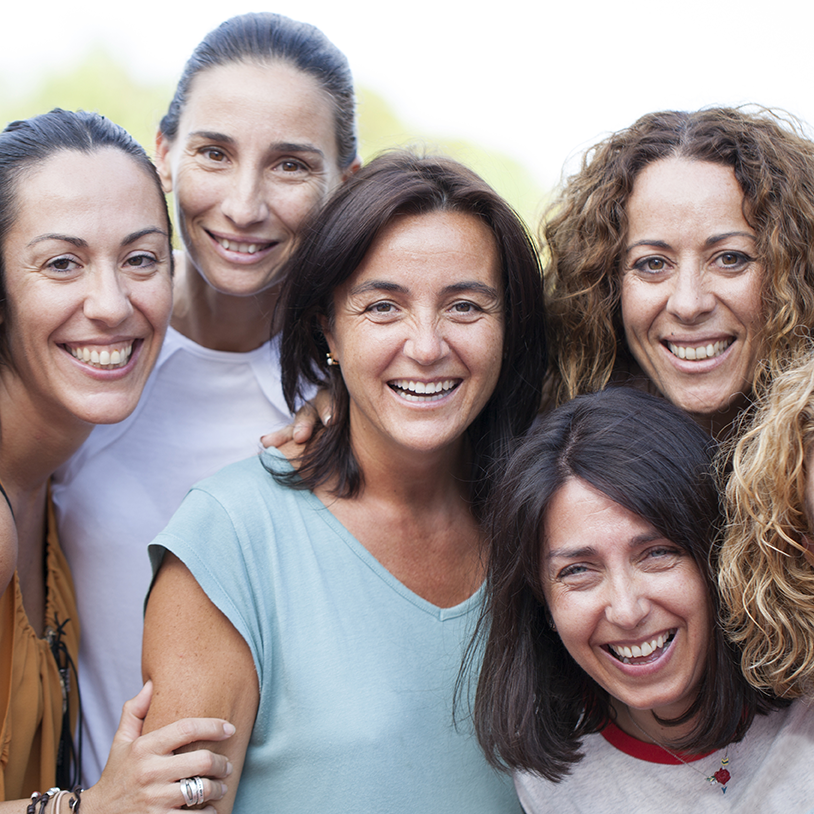
If you or someone you know needs help, call our 24-hour Hotline:

